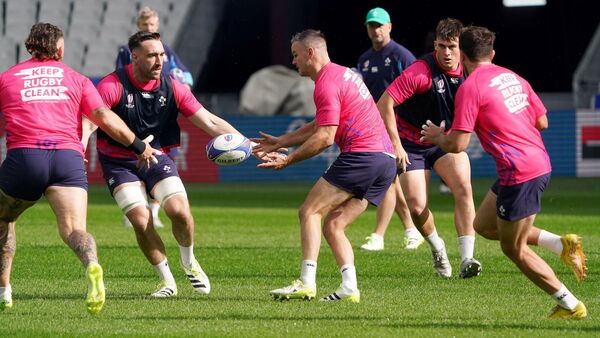
From the moment Rassie Erasmus and Jacques Nienaber launched their 7-1 bench initiative against New Zealand in Twickenham last month, I couldn’t help but think it was trialled specifically with Saturday’s World Cup pool tie against Ireland in mind.
Much was made at the time of the fact that they reverted to a 6-2 configuration of forwards and backs for their opening game against Scotland but, based on the fact that the Scottish front five, coupled with their back-up off the bench, doesn’t possess anything like same power and technical efficiency as Ireland’s, I wasn’t convinced.
When the Springbok management announced their match-day squad two days earlier than required by tournament regulations, they were sending a clear message to the Irish. We’re coming for you. Then again, that hardly comes as a surprise. It’s been the approach of Springboks teams ever since the Afrikaans took a shine to the game over a century ago.
Carrying seven forwards on the bench enables the starting pack go all out from the off, holding nothing in reserve. For example from a scrummaging perspective, under normal circumstances, you wouldn’t go full bore on every engagement.
You would wait for specific scrums in certain areas of the field – in the opposition 22 – where you make the call before engagement to go all out to smash the opposition, usually involving a call for a second drive.
Given that the entire Springbok front five know in advance that they will only be required to go for a maximum of 50 minutes, there’s no necessity to hold anything in reserve. They will attack every set piece as if it’s their last involvement in the game.
They will exert the maximum pressure on every scrum, contest every line out and hit every breakdown with a ferocity that eventually saps the energy out of the opposition. Ireland know what’s coming, and must be prepared to go toe-to-toe without getting sucked into a dockyard brawl. Brains over brawn is the key from an Irish perspective.
The Springbok approach has come as no surprise to the Irish management and they have prepared for this eventuality. Farrell has approached proceedings with a refreshing sense of calm and confidence in sticking with what works best for his team, hence unveiling a familiar 5-3 bench split when announcing his side.
With the likes of Tadhg Beirne, Caelan Doris, and Peter O’Mahony starting, with Iain Henderson and
…. to be continued
Read full article at the Original Source
Copyright for syndicated content belongs to the linked Source : Irish Examiner – https://www.irishexaminer.com/sport-columnists-rugby/arid-41232310.html

